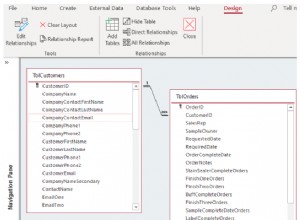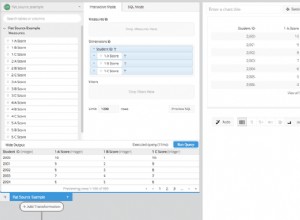Ich habe herausgefunden, dass Ihre solId war für solitications . Ich dachte ursprünglich, es bedeute fest (wie ein Stein). Dies kann also durch Komposition erfolgen.
Beachten Sie, dass das bereitgestellte Schema einige Tippfehler enthält. Einige fehlende Kommas, einige vertauschte Indexnamen. Eine MyISAM-Tabelle wurde in INNODB geändert. Also habe ich etwas umbenannt. Auch um Tisch 5 herum fehlten Tische. Es ist also nicht so, als ob Ihr Skript ausgeführt würde (für die Tabelle rfqs ).
In ähnlicher Weise wird das folgende Schema aufgrund Ihrer fehlenden bereitgestellten Tabellen fehlschlagen, irgendwo zwischen 60 und 70 Prozent.
Bisherige Tabellen:
create schema slipper;
use slipper;
CREATE TABLE `nsns` (
`ID` int(11) NOT NULL AUTO_INCREMENT,
`NSN` char(16) NOT NULL,
`Description` varchar(100) DEFAULT NULL,
`ShortDesc` varchar(20) DEFAULT NULL,
PRIMARY KEY (`ID`),
UNIQUE KEY `NSN_UNIQUE` (`NSN`)
) ENGINE=InnoDB AUTO_INCREMENT=42 DEFAULT CHARSET=latin7;
drop table if exists `solicitations`;
CREATE TABLE `solicitations` (
`ID` int(11) NOT NULL AUTO_INCREMENT,
`NSNId` int(11) NOT NULL,
`UOMId` int(11) NOT NULL DEFAULT '1',
`QUPId` int(11) NOT NULL DEFAULT '0',
`SolicitationNo` char(16) NOT NULL,
`Quantity` int(11) NOT NULL,
`ReturnByDate` date NOT NULL,
`StatusId` int(11) NOT NULL DEFAULT '1',
`Memo` text,
PRIMARY KEY (`ID`),
UNIQUE KEY `SolicitationNo_UNIQUE` (`SolicitationNo`),
KEY `NSN_idx1111` (`NSNId`),
KEY `NSN_idx1112` (`ID`,`NSNId`), -- atm an necessary evil. Revisit, perhaps collapse one
CONSTRAINT `NSNId` FOREIGN KEY (`NSNId`) REFERENCES `nsns` (`ID`)
) ENGINE=InnoDB AUTO_INCREMENT=10 DEFAULT CHARSET=latin7;
drop table if exists `parts`;
CREATE TABLE `parts` (
`ID` int(11) NOT NULL AUTO_INCREMENT,
`NSNId` int(11) NOT NULL,
`VendorId` int(11) NOT NULL,
`UOMId` int(11) NOT NULL DEFAULT '1',
`QUPId` int(11) NOT NULL DEFAULT '1',
`StatusId` int(11) DEFAULT '1',
`PartNo` varchar(45) DEFAULT NULL,
`Memo` text,
PRIMARY KEY (`ID`),
KEY `NSN_idx2222` (`NSNId`),
KEY `NSN_idx2223` (`ID`,`NSNId`), -- atm an necessary evil. Revisit, perhaps collapse one
CONSTRAINT `NSNId2222` FOREIGN KEY (`NSNId`) REFERENCES `nsns` (`ID`)
) ENGINE=InnoDB AUTO_INCREMENT=18 DEFAULT CHARSET=latin7;
drop table if exists `baserfqs`;
CREATE TABLE `baserfqs` (
`ID` int(11) NOT NULL AUTO_INCREMENT,
`NSNId` int(11) NOT NULL,
`BRFQNo` varchar(45) DEFAULT NULL,
`Memo` text,
`Finalized` bit(1) NOT NULL DEFAULT b'0',
PRIMARY KEY (`ID`),
UNIQUE KEY `BRFQNo_UNIQUE` (`BRFQNo`),
KEY `NSN_idx4444` (`NSNId`),
KEY `NSN_idx4445` (`ID`,`NSNId`), -- atm an necessary evil. Revisit, perhaps collapse one
CONSTRAINT `NSNId4444` FOREIGN KEY (`NSNId`) REFERENCES `nsns` (`ID`)
) ENGINE=InnoDB AUTO_INCREMENT=5 DEFAULT CHARSET=latin7;
CREATE TABLE `rfqs` (
`ID` int(11) NOT NULL AUTO_INCREMENT,
`BaseRFQId` int(11) NOT NULL,
`VendorId` int(11) NOT NULL,
`RFQNo` varchar(45) NOT NULL,
`StatusId` int(11) NOT NULL DEFAULT '6',
`DateSent` date DEFAULT NULL,
`DateResponded` date DEFAULT NULL,
`VendorNotes` text,
`QuotedBy` varchar(45) DEFAULT NULL,
`Title` varchar(45) DEFAULT NULL,
`ValidityCodeId` int(11) DEFAULT '4',
`UnitWt` decimal(10,3) DEFAULT NULL,
`WtUOMId` int(11) DEFAULT '1',
PRIMARY KEY (`ID`),
UNIQUE KEY `RFQNo_UNIQUE` (`RFQNo`),
KEY `BaseRFQId_idx` (`BaseRFQId`),
KEY `VendorId_idx` (`VendorId`),
KEY `StatusId_idx` (`StatusId`),
KEY `ValidityCodeId_idx` (`ValidityCodeId`),
KEY `WtUOMId_idx` (`WtUOMId`),
CONSTRAINT `WtUOMId` FOREIGN KEY (`WtUOMId`) REFERENCES `wtuoms` (`ID`),
CONSTRAINT `BaseRFQId` FOREIGN KEY (`BaseRFQId`) REFERENCES `baserfqs` (`ID`),
CONSTRAINT `StatusId` FOREIGN KEY (`StatusId`) REFERENCES `rfqstatus` (`ID`),
CONSTRAINT `ValidityCodeId` FOREIGN KEY (`ValidityCodeId`) REFERENCES `validitycodes` (`ID`),
CONSTRAINT `VendorId` FOREIGN KEY (`VendorId`) REFERENCES `vendors` (`ID`)
) ENGINE=InnoDB AUTO_INCREMENT=5 DEFAULT CHARSET=latin7;
drop table if exists `compTableX001`;
CREATE TABLE `compTableX001`
( -- a composition table for FK's in `baserfqssols`
`ID` int(11) AUTO_INCREMENT PRIMARY KEY,
`BaseRFQId` int(11) NOT NULL, -- baserfqs.ID
`SolId` int(11) NOT NULL, -- solicitations.ID
`NSNId` int(11) NOT NULL,
unique key (`BaseRFQId`,`SolId`), -- no dupes allowed
CONSTRAINT `tx001_base` FOREIGN KEY (`BaseRFQId`,`NSNId`) REFERENCES `baserfqs` (`ID`,`NSNId`),
CONSTRAINT `tx001_sol` FOREIGN KEY (`SolId`,`NSNId`) REFERENCES `solicitations` (`ID`,`NSNId`)
) ENGINE=InnoDB DEFAULT CHARSET=latin7;
drop table if exists `compTableX002`;
CREATE TABLE `compTableX002`
( -- a composition table for FK's in `rfqssolsparts`
`ID` int(11) AUTO_INCREMENT PRIMARY KEY,
`BaseRFQId` int(11) NOT NULL, -- baserfqs.ID
`SolId` int(11) NOT NULL, -- solicitations.ID
`PartId` int(11) NOT NULL, -- parts.ID
`NSNId` int(11) NOT NULL,
unique key (`BaseRFQId`,`SolId`,`PartId`), -- no dupes allowed
CONSTRAINT `tx002_base` FOREIGN KEY (`BaseRFQId`,`NSNId`) REFERENCES `baserfqs` (`ID`,`NSNId`),
CONSTRAINT `tx002_sol` FOREIGN KEY (`SolId`,`NSNId`) REFERENCES `solicitations` (`ID`,`NSNId`),
CONSTRAINT `tx002_part` FOREIGN KEY (`PartId`,`NSNId`) REFERENCES `parts` (`ID`,`NSNId`)
) ENGINE=InnoDB DEFAULT CHARSET=latin7;
drop table if exists `baserfqssols`;
CREATE TABLE `baserfqssols` (
`ID` int(11) auto_increment,
`compId` int(11) NOT NULL, -- composition ID `compTableX001`.`ID`
`LineItemNo` int(11) NOT NULL DEFAULT '1',
PRIMARY KEY (`ID`),
CONSTRAINT `basesol_compX001` FOREIGN KEY (`compId`) REFERENCES `compTableX001` (`ID`)
) ENGINE=InnoDB DEFAULT CHARSET=latin7; -- changed engine type
-- Is it possible to set up a foreign key constraint on RFQsSolsParts that requires SolId and PartId to reference records
-- that have the same NSNId, and requires RFQId to reference a BaseRFQId which has the same NSNId as the other two?
drop table if exists `rfqssolsparts`;
CREATE TABLE `rfqssolsparts` (
-- `RFQId` int(11) NOT NULL, -- requirement BBBBBBBBBBBBB
-- `SolId` int(11) NOT NULL, -- requirement AAAAAAAAA
-- `PartId` int(11) NOT NULL, -- requirement AAAAAAAAA
`ID` int(11) auto_increment,
`compId` int(11) NOT NULL, -- composition ID `compTableX002`.`ID`
`CondId` int(11) NOT NULL,
`UOMId` int(11) NOT NULL DEFAULT '1',
`QUPId` int(11) NOT NULL DEFAULT '1',
`UnitPrice` decimal(10,3) NOT NULL,
`LeadTime` int(11) DEFAULT NULL,
`LTCId` int(11) DEFAULT NULL,
`SplsNSNId` int(11) DEFAULT NULL,
`SetupCostInc` bit(1) NOT NULL DEFAULT b'0',
`CertCostInc` bit(1) NOT NULL DEFAULT b'0',
`MfgCerts` bit(1) NOT NULL DEFAULT b'0',
`Altered` bit(1) NOT NULL DEFAULT b'0',
`OrigPkg` bit(1) NOT NULL DEFAULT b'1',
`SplsContNo` varchar(45) DEFAULT NULL,
`SplsDate` date DEFAULT NULL,
-- PRIMARY KEY (`RFQId`,`SolId`,`PartId`)
PRIMARY KEY (`ID`),
CONSTRAINT `triplet_compX002` FOREIGN KEY (`compId`) REFERENCES `compTableX002` (`ID`)
) ENGINE=InnoDB DEFAULT CHARSET=latin7;
compTableX001 ist wie eine Zwei-Eltern-Ein-Kind-Mini-Hierarchie mit dem Namen ID . Also ID ist der Name der Elternschaft. Es hat zwei Elternteile (BaseRFQId und SolId ) und ein untergeordnetes Element (NSNId ). Der Name oder Bezeichner als ID , ist das FK-Ziel der baserfqssols Zeile, die es unterstützt. Verwiesen und Referenzieren .
Ebenso compTableX002 scheint nun die Bedingungen für Frage 2 zu lösen.
Bereinigung:
drop schema slipper;




